- Home
- J. F. Penn
Pentecost. An ARKANE Thriller (Book 1)
Pentecost. An ARKANE Thriller (Book 1) Read online
Contents
Title Pentecost
Quote
Prologue
Times of India: Miracle Press Release
May 18
Oxford, Morgan's Office
Firefight
Pitt Rivers
Woodstock
Pitt Rivers
Woodstock
The package
May 19
Private airstrip, England
St Bartholomews
ARKANE, London
Blackfriars. Oxford
Marietti's Office
Tucson, Arizona
May 20
Brize Norton
Santiago de Compostela, Spain
Botafumeiro
Crypt
Homeless
On the plane
May 21
Tabriz, Iran
Kiln
May 22
St Peter's Basilica, Rome
St Mark's Basilica, Venice
Arizona Desert
May 23
Doge's Palace
Amalfi
May 24
New York Post: Comet Press Release
Church of the Holy Sepulchre
Tel Aviv
Blackfriars
The Red Book
May 25
Nefta, Tunisia
Desert, Algeria
May 26
Clark University
Underground
Buzzing
Betrayal
May 27
Biosphere dawn
Oracle
Pyre
Destruction
2 weeks later
Thank you (Amazon)
Author's Note
About J.F. Penn
Acknowledgements
Pentecost
By J.F. Penn
Book 1 in the ARKANE thriller series.
Copyright © Joanna Penn (2011). All rights reserved.
http://www.JFPenn.com
This book is a work of fiction. Any resemblance to actual events or persons, living or dead, is entirely coincidental.
When the day of Pentecost came, they were all together in one place. Suddenly a sound like the blowing of a violent wind came from heaven and filled the whole house where they were sitting.
They saw what seemed to be tongues of fire that separated and came to rest on each of them. All of them were filled with the Holy Spirit and began to speak in other tongues as the Spirit enabled them.
Everyone was filled with awe, and many wonders and miraculous signs were done by the Apostles.
Acts 2:1-4, 43
Varanasi, India.
May 1, 1.34am
It is said that those who die in Varanasi can achieve moksha, release from the suffering of repeated death and rebirth. So many people come to die here and be burnt on the ghats that the pyres burn continually day and night, even when rain lashes down, soaking the firewood. Wet bodies take longer but eventually they all turn to ash and are washed into the river that cleanses all sin. On this night, rain soaked the ashes into the winding Varanasi streets, rivers of leaden mud returning to the source. Beggars shivered on the steps leading down to Manikarnika, the main burning ghat on the banks of the holy river Ganges. The ragged ones huddled closer to the smouldering bodies for warmth, watching as they were consumed by the sacred flames.
Behind the ghats, streams ran down the pavements, leaving the excrement and rubbish of the day in the doorways and corners of the Old City. Sister Aruna Maria hurried down an alleyway behind the spice markets, forcing her old feet to move faster, stumbling a little as she pushed off the walls that loomed above her. She glanced behind, sensing that those following were close, but seeing nothing in the shadows yet. An hour ago, she had heard men come into the little church tucked away inside the holy Hindu city and speak to one of the caretakers of the convent. She had listened with growing fear as they asked about an ancient stone, and she had peeked around a pillar to see money changing hands.
She ran then, heading for the anonymity of the streets, but she knew that Christians were barely tolerated by the sadhus. Beggars would point her direction for a single rupee and the men would be on her trail soon enough. Aruna Maria pushed herself faster into the labyrinth of narrow streets. How they had found her after so many years she could not fathom, but she knew it was time to hide the stone again. For she was the Keeper, the latest in a long line stretching back two millennia, each one prepared for the day when evil men would come for what she protected. Now it seemed, they had found her.
Beneath the sound of the rain she heard running feet closing behind her. Aruna Maria clutched the soaked habit in her gnarled hand as she desperately searched for sanctuary, for some dark corner to hide in. She pulled the ivory material closer around her and splashed through the puddles. She had run through these streets since her childhood, she knew the markets well and was sure she could outpace this evil now. A tall figure stepped out before her, dressed all in black so he seemed to emerge as a wraith from the shadows that dominated these close alleys. It was the man from the church. His face was almost boyishly handsome but his gaze chilled her with the thinly veiled threat of violence. She gasped and turned to flee in the opposite direction but another man had run up behind her. The streets, so busy in the day, were now empty, shutters closed and eyes turned from her trouble.
“Calm down, sister, we only mean to talk to you.”
She could tell the man was American by his accent, but although his words promised safety, she could see his eyes in the dim light. They were shining with a fanaticism she recognized, a hunger for something she and few others possessed in the world.
“I know you have an Apostle’s stone. All you have to do is give it to me and you’ll go free.”
He reached towards her, but she stood her ground, heart pounding.
“Don’t you dare touch me. I’m set apart for God. I don’t know of this stone you seek.”
“Oh, but you do, sister.”
Aruna Maria felt strong arms pinning her, holding her still while the American advanced towards her. As fear tightened around her heart, she began to pray, ancient words handed down by the Keepers, spoken in her own native Indian tongue. High above her head, storm clouds gathered, forming a tight vortex in shades of midnight. She felt an upwelling in her spirit as the words ran together, strange tongues transforming her voice as she called to God in the language of the angels. One hard hand closed around her throat, forcing her head back and silencing her prayers. With the other, the man found the thin cord in the folds of her habit. He lifted the stone out and over her head.
Rain lashed down on the three of them now, soaking their clothes, running down their faces. The man looked closely at the stone in his palm, roughly carved whorls set in a deeper grey, as he held it with reverence.
“This is what I’ve been searching for, sister. Now tell me what it can do.”
Aruna Maria looked up into the approaching storm and prayed aloud, her words stronger now. She was sure that God would hear her as he had heard the cries of the faithful since the days of Abraham. Thunder rolled across the sky and lightning crashed. Fire lit up the heavens above them and flashed down to earth as if to strike the heathen. Aruna Maria was transfixed by the storm but then the man slapped her face hard and her head snapped sideways. The stinging blow made her head reel and spin but she held her ground.
“Tell me how to use it,” he demanded. “I must know.”
She looked at him, her eyes holding the knowledge of ancient years and the secrets he so desperately wanted.
“The power of the stones was sent by God and forged in the blood of martyrs in the first century, by the f
aith of the early Christians. Such power cannot be taken by men like you. The only way for you to see the power is to gather all the stones of the Apostles together, but they are lost to time and history now. They haven’t been in one place since Pentecost itself, over two thousand years ago. The Keepers were scattered and none of us know of the others, so you cannot gather what you seek.”
She smiled at his rising anger as a peaceful calm descended on her. Was this how the blessed martyrs felt when they faced death? The shadowed man roared then, his rage quickened by the violence of the storm. He tore her from the grip of the other man and threw her into the mud of the alleyway, kicking her old body again and again, his boots crushing the breath from her. Aruna Maria looked up into the heart of the storm and as she sank into blackness she saw a pillar of fire coming down from heaven.
***
When she came to, Aruna Maria couldn’t move, she couldn’t see. She tried to scream but her throat was blocked. Her whole body was paralyzed. She could barely breathe, but a small amount of air seeped through the bindings that wrapped her. She screamed in her mind and panic overwhelmed her as she gasped for breath on the edge of consciousness. She attempted to rock in place but nothing happened. She tried to figure out where she was knowing that the men had taken the stone. She had failed in her sacred duty and perhaps she deserved whatever fate was coming, for God had surely turned his face that day.
She was lying flat, being carried by people who were walking around many corners. It felt like she was on a stretcher of some kind, wrapped tightly in material. The sound of chanting filled her ears and Aruna Maria inhaled sharply as she realized it was the death chant of Shiva and she was on a funeral pyre being carried to Manikarnika ghat. It was customary to burn the dead as soon as possible after death and the men were covering their tracks by getting rid of her body. They would have paid for a quick burning amongst the many genuine dead. Panic rose in her throat as she struggled against the bonds that held her. She had to tell someone she was alive, because the ghats were not far from the temple. It wouldn’t be long before she was on a pyre, burning alive and watched by the tourists who came to gawp at the spectacle.
In the past, Aruna Maria had been fascinated by how the flaming pyres had hypnotized the visitors, some stared into the flames considering their mortality, others clicked away with close-ups of cracking bones sticking out from the smoldering fires. They wanted to see the spectacle of death laid out before them, for the experience was anathema to clinical western cremation, where the face of death was hidden. But she knew the tourists had no idea of the bodies that lay just beneath them in the water, weighed down by stones, and swaying in the current. For children, pregnant mothers, holy cows and sadhus were not burnt but sunk into the river Ganges to live again in the cycle of reincarnation. Corpses often surfaced on the east bank of the river, to rot in the sun and be eaten by carrion birds. This place existed for death and tonight was no different, but the tourists were unaware of the living flesh about to be burnt alive before them.
Aruna Maria’s heart pounded as she considered the ritual to come for she had watched these ghats all her life. The corpse was brought to the burning ghat on a stretcher, wrapped in holy saffron gold and crimson material, then draped in marigolds. The pyre is built and tended by the Dalit, the Untouchable caste, who take the wrapped cadaver from the chanting family and dip it into the holy river Ganges before placing it onto the pyre. More wood is heaped on top and then it is lit. The fires take the soul to heaven and the dead are released from the cycle of reincarnation. If a skull remains unburnt, it is smashed, releasing the spirit. The ashes and bones are finally swept into the Ganges, mixing with the river of life as it flows to the ocean.
Aruna Maria smelled the pungent smoke of the fires, the heavy scent of marigolds and felt herself being laid down. The chanting reached a crescendo. If only she could scream or move but she was too tightly wrapped. She was lifted again and felt the shock of cool water as she was dipped into the sacred river. She began to pray desperately to her God as she was laid on the pyre and the fire began to lick her skin through the wrapping. Her prayers turned to silent screams as her throat burnt through, silencing her before she died.
A cloaked figure stood by the pyre gazing into the flames as the body crisped and charred. His fingers rose to touch the stolen stone around his neck as he turned and faded into the alleyways of night.
Extract from The Times of India,
May 2.
A violent storm rocked the city of Varanasi last night, with lightning igniting fires across the city even in the heavy rain. Scientists cannot explain how the fires burned so fiercely in monsoon conditions, but witnesses said lightning was seen in balls of scarlet fire as well as forked flames. A pillar of fire was reportedly seen above Manikarnika ghat on the banks of the Ganges.
“It was as if a whirling djinn was in our midst,” said Rajiv Gupta, a local tradesman.
Even more unusual were reports of miracles that occurred at the time the pillar of fire was sighted. Beggars living on the edges of the ghat, drawn to the fiery spectacle, have claimed to be healed of various diseases and one man allegedly regained his sight after twenty years of blindness. Hindu priests as well as the police are investigating the claims, reportedly attributing them to mass hysteria associated with the violent storm.
May 18
Oxford, England.
May 18, 9.46pm
Dr Morgan Sierra sat at her desk, finishing notes on her cases for the day. Glancing at the time, she stood up and stretched, rolling her neck to loosen the taut muscles. It had been another long day, she thought, but there was no one to go home to and time for just a few more pages. Crossing the office to the small kitchen, she refilled her coffee cup, the bitter black her only real addiction. The fledgling practice was slowly gaining clients as her expertise in dealing with religious and psychological issues became known, but the University still frowned on her specialty. She battled their criticism daily while balancing her lecturing and tutorial appointments. Morgan’s clinical psychology practice dealt particularly with people whose problems related to religion in some way, those trapped in cults or who claimed supernatural experiences. She also increasingly consulted with government think tanks on the impact of fundamentalist religion in the country. It had been hard work but Morgan had built up her practice to supplement the meager number of students she taught at the University in anomalistic psychology. The field studied ostensibly paranormal activity and behavior under scientific conditions, analyzing why certain phenomena existed and how they could be explained. Morgan sometimes wondered what she was trying to prove to herself, let alone others.
She sipped the hot coffee as she gazed at her many bookshelves, her mind wandering. Even while she loved being there, Morgan knew that the issue with the University of Oxford was its age and the instant kudos the name evoked. It trapped scholars and all who worshipped at their feet into ancient thought patterns with no room for change or progress. She thought of the doors in the Bodleian library, the venerable institution just around the corner from her office. The names of the Schools were written above them, inscribed in an ancient hand, gold-leafed and stamped into thick oak, banded with copper. Divinity and Scientia were two separate doors and the problem was that her door sat between them, and neither entirely accepted her field of research. Psychology sat within the Faculty of Science and was concerned with measurement, the scientific method, statistical instruments, experiments, control, even animal labs. The Faculty of Theology sat within Divinity, among the monks of Blackfriars, the nuns of the convent of the Assumption at Headington and the Quakers of St Giles. The Theology curriculum still boasted St John’s Gospel in Greek, Israel before the exile and Patristics, while students still debated the Trinity with arguments used by Origen and Augustine, unchanged since the fourth century. Dons wore black soutanes on Sundays, held the Eucharist and celebrated Mass while on weekdays they held forth on dogma and ritual. They were the faithful. Morgan felt she was
an anomaly between the two faculties because she specialized in the phenomena between psychology and religion, the unexplained between science and faith, that which fell through the gap.
Thinking of the Faculty took her back to her father and growing up with him in Israel. She looked down at the picture of him on her desk, his smiling eyes forever captured in the silver frame. She traced his image with a fingertip. He would have been proud to see what she had become and where she sat now, although he had been taken from her too soon to see it. On the days she felt inadequate, an impostor in this eminent place, she remembered that he had always believed in her and she carried on in his memory. It had been his library and study of Kabbalism that had first inspired her. It had sparked her own search for divinity and truth. He had found peace in it, but she had yet to find her own. She had joined the Israeli Defense Force, as all young people were required to do but she stayed on after the mandatory period as they had funded her training as a psychologist.
Morgan had been employed to investigate how fundamentalism affected behavior on both sides of the ideological fence. She smiled to herself as she remembered how her studies had ignited such heated debates with her father. After several years of active service, she had believed that the key to any form of peace was an understanding between the faiths, a common ground rather than a divisive duality. Evil and violence could be found on all sides and virtue wasn’t owned by anyone’s god. That wasn’t such a popular stand though and it was easier to think about such issues in the sterility of Britain, away from the religious melting pot of Israel. She sighed, leaning forward to complete her notes as the clock ticked towards ten.
Her assistant had left hours ago and Morgan was finishing alone before heading back to her little house in the up and coming area of Jericho. She had been expecting a visit earlier from an American academic who had an interesting proposition for her, but he hadn’t shown up. She had agreed to talk with him because he had mentioned research affiliations with her old University in Israel as well as opportunities in the US which might serve her career well. Oxford looked favorably on academics who brought in their own research grants. Maybe she would call him tomorrow, but for now it was time to head home. She began to pack up her files, preferring to start with a clean desk every morning.

 Valley of Dry Bones
Valley of Dry Bones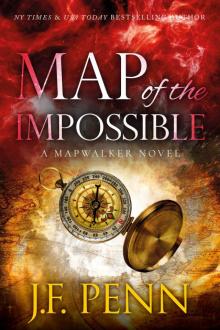 Map of the Impossible
Map of the Impossible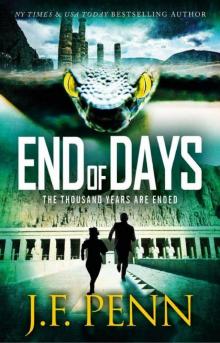 End of Days
End of Days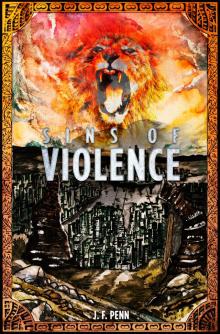 Sins of Violence
Sins of Violence Day of the Vikings
Day of the Vikings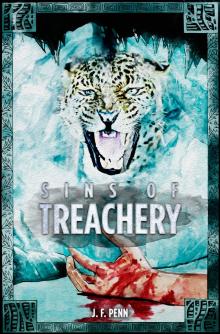 Sins of Treachery
Sins of Treachery A Mapwalker Trilogy
A Mapwalker Trilogy Desecration
Desecration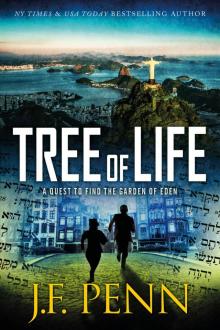 Tree of Life
Tree of Life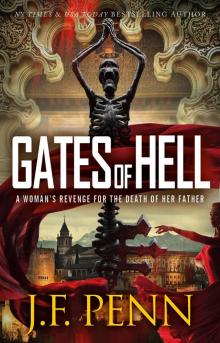 Gates of Hell
Gates of Hell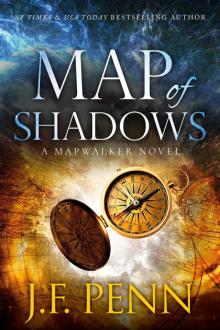 Map of Shadows
Map of Shadows Risen Gods
Risen Gods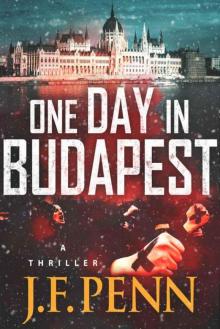 One Day In Budapest
One Day In Budapest Delirium (London Psychic)
Delirium (London Psychic) Day of the Vikings. A Thriller. (ARKANE)
Day of the Vikings. A Thriller. (ARKANE) Pentecost. An ARKANE Thriller (Book 1)
Pentecost. An ARKANE Thriller (Book 1) Deviance (The London Psychic Book 3)
Deviance (The London Psychic Book 3) Prophecy. An ARKANE thriller. (Book 2)
Prophecy. An ARKANE thriller. (Book 2)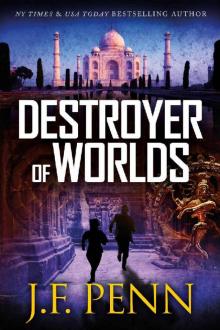 Destroyer of Worlds (ARKANE Book 8)
Destroyer of Worlds (ARKANE Book 8)